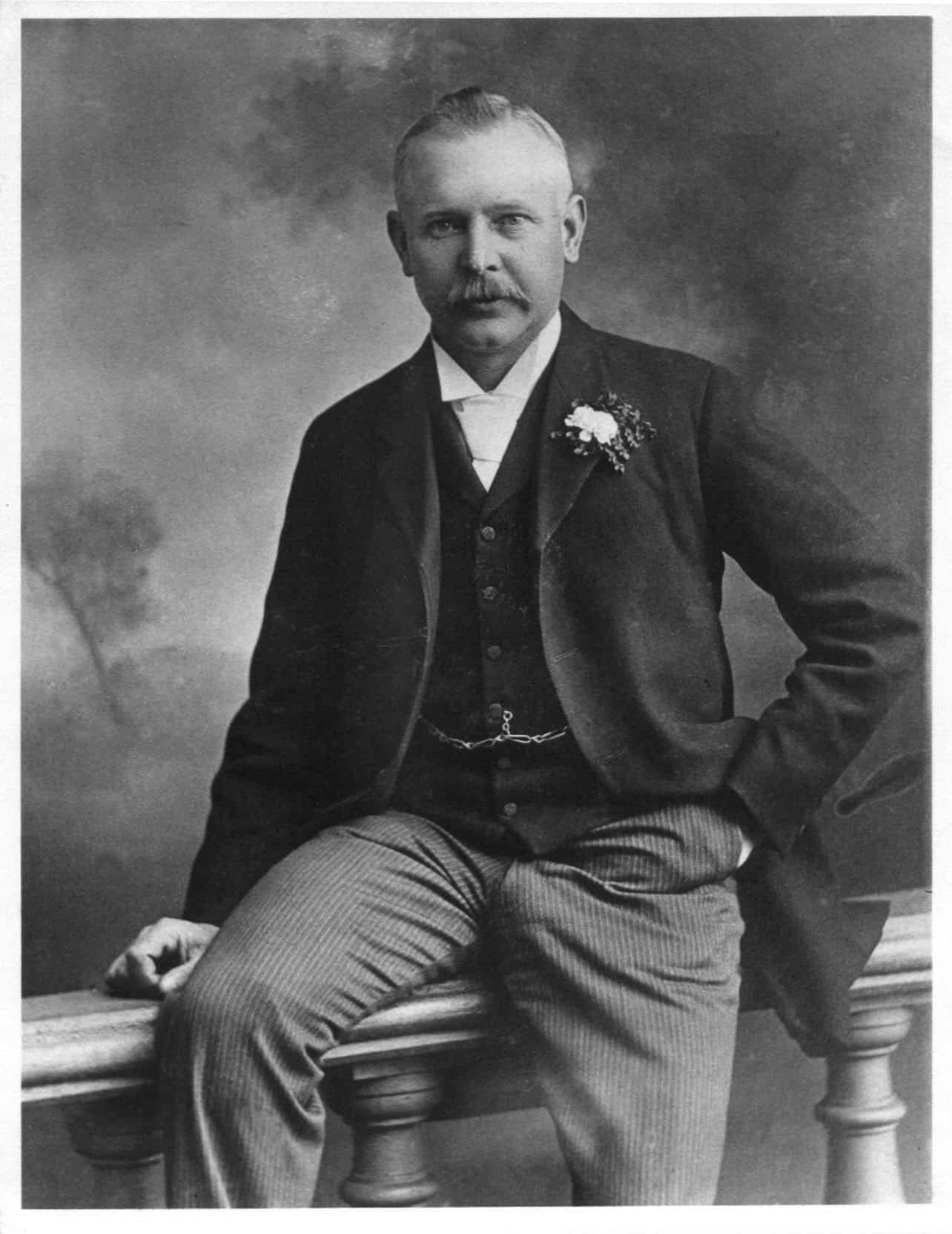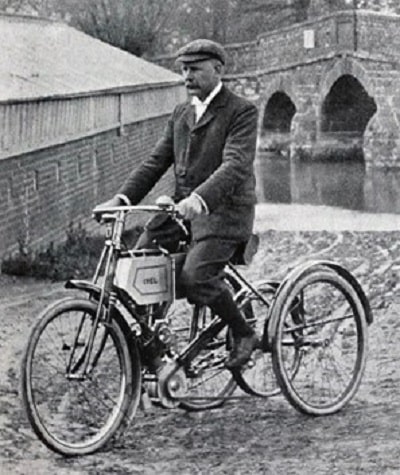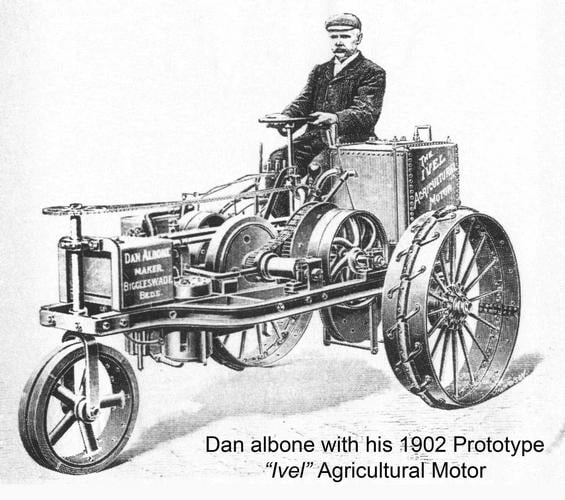Dan Albone is best known internationally as the Inventor and Manufacturer of the World’s First practical and successful farm tractor the Ivel, Father of the British Tractor Industry. Also Inventor of Safety Cycle, Motorcycles and Motorcars named Ivel.
Dan Albone was born on the 12th September 1860 at the Ongley Arms inn in Biggleswade, Bedfordshire, the youngest of eight children of Edith and Edward Albone. Dan’s interest in the invention of the bicycle started at the age of nine when his cousin Edward presented him with a Boneshaker bicycle. Dan soon became a very competent cyclist and won many local races and by the age of thirteen built a Penny Farthing bicycle all by himself. Dan’s mother noticed Dan’s great skill in making a bicycle and apprenticed him to a local firm of T. Course & Sons, Engineers & Millwrights of Hitchin Street, Biggleswade.
In 1880 Dan named his cycle business The Ivel Cycle Works after the river which flows through Biggleswade. His endeavour was to produce a reliable, lightweight machine requiring the minimum of effort to ride and capable of considerable speed. Ivel Cycles quickly became favoured by well-known racing cyclists, despite the undoubted attractions held out by many well known factory makes. With Dan’s great interest in cycling, he started the Biggleswade and District Bicycle Club at his home, the Ongley Arms, in 1880.
Not only was Dan a mechanical wizard, he rapidly became known as a champion cyclist. He was awarded the championships of Bedfordshire on five occasions and used to ride many long distance rides of a hundred miles or more just for the fun of it, often on very bad roads. Dan became a cycling record breaker on his famous lyel Racing Bicycles, and many of Britain’s top racing cyclists rode to victory on Ivels in many big cycling events.


The Ongley Arms became popular with cyclists – somewhere they new they could get help with advice and repairs. The pub was extended with Dan as the licencee, and the neighbouring Black Swan became the Ivel Hotel.
Dan was one of the first to add internal combustion engines to bicycles and tricycles to Britain.
In 1885 John Kemp Starley exhibited his Rover Safety bicycle at the Stanley show. Albone copied this idea, and combined it with the Hillman, Herbert and Cooper cross frame design to produce the Ivel Safety cycle, in April 1886. This became very popular with sports cyclists. On 5 October 1886 George Pilkington Mills, on an Ivel Safety, achieved a world record 24-hour distance of 294.5 miles (474.0 km).
Albone went on to invent a tandem safety bicycle with Arthur James Wilson, cycle pump clamps with Richard Tingey, and a child carrier accessory for his cycles. By 1893 a general downturn in the economy had put many cycle manufacturers out of business, and Albone put the Ivel Cycle Works into voluntary liquidation.
During the late 19th century, power on farms was provided mainly by horses. Steam-powered portable engines and self-propelled traction engines had been introduced for agricultural work from about 1850, but the traction engines were too heavy for direct ploughing of the heavy soil found in Britain. In the 1890s, internal combustion engines started to become more common, but these were stationary engines for belt-driven agricultural machinery. An oil-powered traction engine had been developed, by Hornsby-Ackroyd in 1897, but like the steam-powered traction engines, this was very heavy at 8600 kg (8.5 tons).
Albone conceived a light-weight petrol-powered general purpose agricultural vehicle. By November 1901 he had completed his tractor design, and filed for a patent on 15 February 1902. On 12 December 1902 he formed Ivel Agricultural Motors Limited. The other directors were Selwyn Edge, Charles Jarrott, John Hewitt and Lord Willoughby. He called his machine the Ivel Agricultural Motor, the word ‘tractor’ did not come into common use until later.[5]
Dan’s “tractor” won silver medal at the Royal Agricultural Show, in 1903 and 1904; and in February 1904 an Ivel Agricultural Motor won a Gold Medal in the Chester Ploughing Match held at Waverton, this being the first occasion on which a competition of that kind had been open to mechanically propelled ploughs.[6] About 500 were built, and many were exported all over the world. The original engine was made by Payne & Co. of Coventry. After 1906, French Aster engines were used. Over time it became heavier and more powerful, but it failed to keep pace with its rivals. The company declined after 1910, and in 1920 it went into receivership. The assets were bought by United Motor Industries Limited.
The Ivel Agricultural Motor was light, powerful and compact. It had one front wheel, with solid rubber tyre, and two large rear wheels like a modern tractor. The engine used water cooling, by evaporation. It had one forward and one reverse gear. A pulley wheel on the left hand side allowed it to be used as a stationary engine, driving a wide range of agricultural machinery. The 1903 sale price was £300.

Dan Albone married Elizabeth Martha Moulden in August 1887. They had two children. On 30 October 1906, while at work, Albone suffered a stroke and died. He was buried in Biggleswade on 2 November.